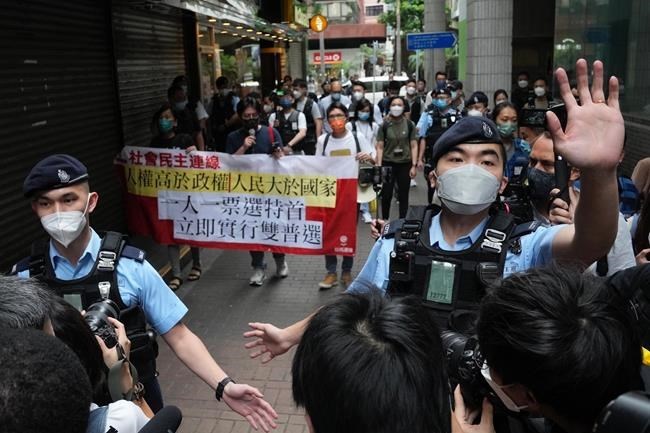HONG KONG (AP) — John Lee was elected as Hong Kong's next leader Sunday by an election committee comprised of nearly 1,500 largely pro-Beijing members.
Lee received 1,416 votes in the chief executive election, far exceeding the 751 votes needed to win. More than 97% of the Election Committee cast their votes in a secret ballot Sunday morning.
As the only candidate in the polls, Lee was expected to win, especially since he has Beijing’s endorsement and last month obtained 786 nominations from members of the Election Committee in support of his candidacy.
Lee will replace current leader Carrie Lam on July 1.
The election on Sunday follows major changes to Hong Kong’s electoral laws last year to ensure that only “patriots” loyal to Beijing can hold office. The legislature was also reorganized to all but eliminate opposition voices.
The elaborate arrangements surrounding the pre-determined outcome speak to Beijing’s desire for a veneer of democracy. Though they will vote in a secret ballot, Hong Kong’s electors have all been carefully vetted.
On Sunday morning, three members of the League of Social Democrats, a local activist group, protested the election by attempting to march toward the election venue while displaying a banner demanding universal suffrage that would allow Hong Kongers to vote both for the legislature and the chief executive.
“Human rights over power, the people are greater than the country,” the banner read. “One person, one vote for the chief executive. Immediately implement dual universal suffrage.”
One protester was handing out flyers before police arrived and cordoned off the protesters and the banner. Police also searched protesters' belongings and took down their personal details, though no arrests were immediately made.
The pro-democracy camp in Hong Kong has long demanded universal suffrage, which they say is promised to the city in its mini-constitution, the Basic Law. It was also a key demand in the 2014 Umbrella Revolution protests and 2019 anti-government demonstrations.
Lee as Hong Kong’s future leader has sparked concern that Beijing could further tighten its grip on Hong Kong. He spent most of his civil service career in the police and security bureau, and is an outspoken and staunch supporter of a national security law imposed on Hong Kong in 2020 aimed at stamping out dissent.
His rise grew out of massive anti-government protests in 2019 that spiraled into violent clashes. As security secretary, he oversaw the police campaign to confront protesters with tear gas and rubber bullets, then rounded many of them up for arrest later.
More than 150 people have been arrested under the security law, which outlaws secession, subversion, terrorism and collusion with foreign forces to intervene in the city’s affairs. Almost all prominent pro-democracy activists have been jailed, with others fleeing abroad or being intimidated into silence.
Thousands of residents have left the city of 7.4 million people amid the 2019 protests and subsequent harsh pandemic restrictions, including many professionals and expatriates.
In his election campaign in the weeks leading up to Sunday’s polls, Lee pledged to enact long-shelved local legislation to protect against security threats and vowed to increase housing supply in the world’s most expensive real estate market.
He also said he would improve the city’s competitiveness and set a firm foundation for Hong Kong’s development.
The Associated Press


